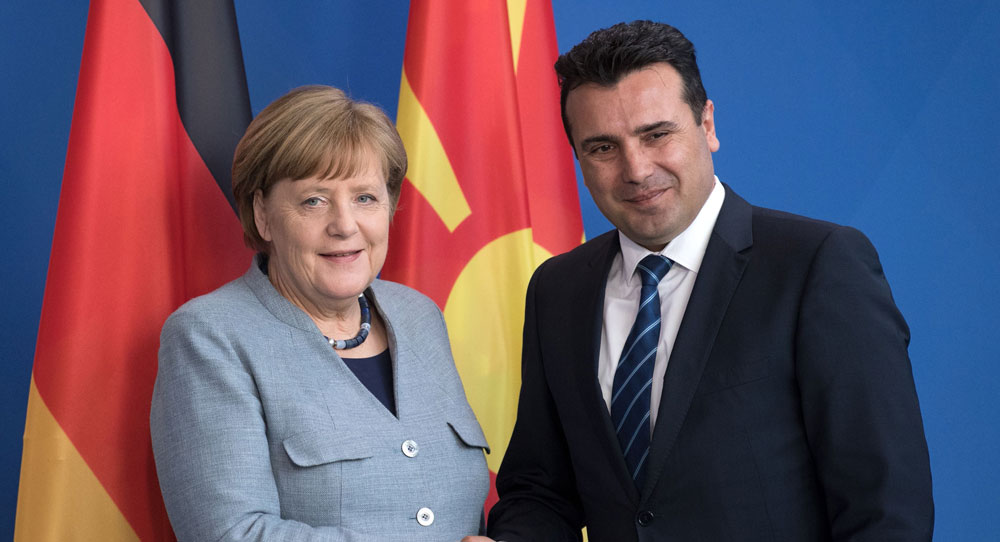Even though it is Europe’s back garden, over the past several years the Western Balkans has been left in a state of benign neglect.
Despite the fact that the region was plunged into civil war during the early 1990s following the collapse of Yugoslavia, EU attention on the Western Balkans has largely been erratic.
Any amount of lip service has been given to these six countries—Albania, Bosnia-Herzegovina, Kosovo, Macedonia, Montenegro, and Serbia—about the possibility of one day joining the EU.
This lip service and lack of a perspective allowed these countries to drift. Reform-minded politicians were sidelined. Local oligarchs and corrupt political elites worked hand in hand to weaken the rule of law, weaken the media, weaken the opposition, and weaken civil society. The EU’s passivity only emboldened a status quo that had no interest in reforms, transparency or accountability.
Macedonia was such a case.
This small country of just over 2 million inhabitants has lurched from crisis to crisis since it declared independence in 1991. Over the past few years, not only did reforms stop. The republic, in the words of its foreign minister, Nikola Dimitrov, was turned into a captive state.
Almost two years ago, the government was embroiled in a wiretapping scandal that highlighted widespread abuse of office and corruption. Then a year later, over 200 masked men, known to support the then VMRO-DPMNE-led coalition government, stormed the parliament and attacked MPs.
Macedonia’s political crisis continued until last December, when Zoran Zaev, leader of the leftwing opposition SDSM party, became prime minister. With speed and zealousness, his administration has embarked on deep structural reform efforts. They were long overdue, Dimitrov, a former civil activist and former think tanker told me.
“There was a crisis of impunity. The institutions failed to tackle it. The institutions were too weak. This crisis triggered a mobilization of citizens across ethnic lines. They demanded justice,” Dimitrov said in Berlin after he and Zaev met with Chancellor Angela Merkel.
The government is already putting in place major changes. “It’s about making the rule of law and accountability prevail,” Dimitrov explained. There is now, for example, a triple layer of oversight for intelligence services to prevent political interference. This layer consists of the public prosecutor, civil society, and parliament. The media, too, is being weaned off political influence—no easy feat for a region in which investigative journalists have been intimidated and imprisoned.
And all major reforms “are done and/or discussed in cooperation with civil society. This is about transparency. Civil society is an ally of the government,” added Dimitrov who took a five-fold cut in his salary to return to his country from the Netherlands.
Yet even if Macedonia meets all the criteria set out in the EU’s new strategy for the Western Balkans, which offers a “credible enlargement perspective,” there’s no guarantee that the republic will be able to leave the waiting room. This is because of Greece and how Central Europe is giving enlargement a bad name.
In 2008, Greece—an EU and NATO member—blocked Macedonia’s entry into NATO and the start of EU accession talks. The reason is that Athens has long insisted that the name, “The Republic of Macedonia,” implies a territorial claim to the northern Greek province of the same name. This dispute has kept Macedonia’s EU and NATO memberships on hold. In the meantime, Macedonia, internationally, has been called FYROM—the Former Yugoslav Republic of Macedonia.
The former VMRO-DPMNE-led coalition certainly didn’t help matters. It resorted to using nationalist rhetoric and symbols that hardened Greece’s stance. It named the airport in the country’s capital, Skopje, after Alexander the Great, the ancient warrior king. Greek officials railed at this decision, arguing the king was part of the Hellenic heritage. A motorway was also named after him.
In a bid to resolve the dispute, Dimitrov said the airport and motorway have been renamed “Skopje International Airport” and “Friendship” highway. “The evocation of the nineteenth century and using symbols made things worse,” Dimitrov said. “The more you delve into history, the more you are insecure,” he added.
With a new tone in Skopje, there seems to be some modest movement between Skopje and Athens. With UN mediation, both sides have begun to discuss how to resolve the name issue. “It’s immensely complex,” said Dimitrov, who is involved in these negotiations himself.
The other issue dogging Macedonia (and the other Western Balkan countries, too), is perception.
The publics in big EU countries, such as Germany and the Netherlands, are more than skeptical about further European enlargement. They see the corruption, trafficking, and weak rule of law among its southern neighbors. They just have to point to Bulgaria and Romania, which joined the EU in 2008, as examples of persistent breaches of the rule of law and consistent failures to tackle corruption.
They also ask that if the Western Balkans countries were admitted to the bloc, what’s to prevent them from going the Hungarian and Polish nationalist way when it comes to safeguarding the independence of the judiciary, the courts, and the media.
Dimitrov has no illusions. One of his many other tasks is to win over the skeptics. That means convincing influential European countries that Macedonia is finally on the reform path. Norway and Sweden have redoubled their financial support for Skopje’s reform efforts. The foreign minister sums the situation up well: “The journey is uphill. But it’s less difficult to climb the mountain with supportive friends. The Western Balkans will be a region that exports problems if we don’t do the unfinished job.”











